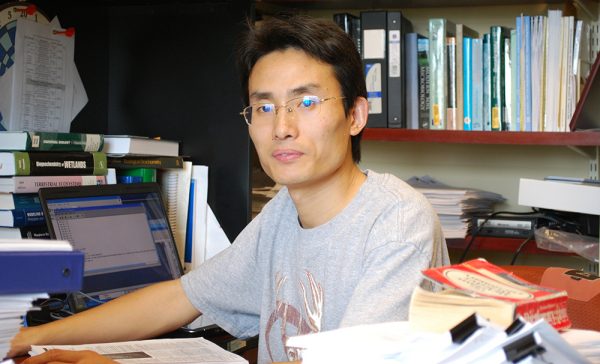New Biology Professor sees the ‘Big Picture’ of Environmental Science
March 2, 2016

When assistant ecology professor Xiaofeng Xu is not teaching any courses this semester, he keeps busy with his research and getting acclimated to life at San Diego State.
Xu is one of the new faculties in SDSU’s biology department. He will teach “Environmental System Modeling: Principles and Application” this fall, a course which will use his modeling approach to study the ecology of environmental science.
Growing up, Xu knew he wanted to be a scientist but did not know what field most interested him until he entered college.
“During that time I didn’t understand many things, but I did know that biology is important,” Xu said. “This was in the mid-1990s, so everyone was saying that biology was important.”
Xu received his bachelor’s degree in biotechnology at Henan Normal University in Xinxiang, China, and received his master’s in environmental science from the Chinese Academy of Sciences in Changchun, China. Xu’s academic path and his research then led him to study at Auburn University, where he received his doctorate in forest biology and ecology.
“When I graduated from college, I was still doing lab-based experiments, and I realized I wanted to lend more knowledge to real nature,” Xu said. “That’s why I switched to environmental science, because it’s still based around biology.”
While getting his master’s degree, Xu gathered soil samples from fieldwork in China and studied how the microbiology chemical process works in nature. That led to a new curiosity for how the process differs in different environments, and Xu developed a “big picture” approach to his work.
This change in perspective is what led Xu to travel to the U.S. to continue his research.
Xu explained that he transitioned to a modeling approach to research differences in different environments.
The modeling approach professor Xu uses works by using mathematical knowledge to study ecology. The approach simplifies an ecological problem and puts it into an equation.
“With the modeling approach, it’s easier to compare different locations,” Xu said. “You can study the dynamic of the ecological system and further predict the behavior of this ecological system.”
Xu’s colleague David Lispon further explained Xu’s work with ecological modeling.
“He’s an ecosystem modeler who understands microbiology,” Lispon said. “His work on incorporating microbial processes into models improves their accuracy and helps us understand how processes normally studied at a small spatial scale can have important, large-scale consequences for how ecosystems function.”
Xu’s academic path has taken him on a journey from small-scale scientific research in a lab to large-scale scientific research, comparing environments and ecosystems all across the globe.
Xu’s influence on the scientific community extends past his research contributions. He also provides training and education for other researchers about his modeling approach.
“We help grad students learn how to use cutting-edge technology to answer cutting-edge questions,” Xu said. “Using this opportunity to help students learn and grow helps us as well to finish our projects.”
– See more at: http://www.thedailyaztec.com/75302/arts-and-lifestyle/new-biology-professor-sees-the-big-picture-of-environmental-science/#sthash.QUWZ8EuI.dpuf

